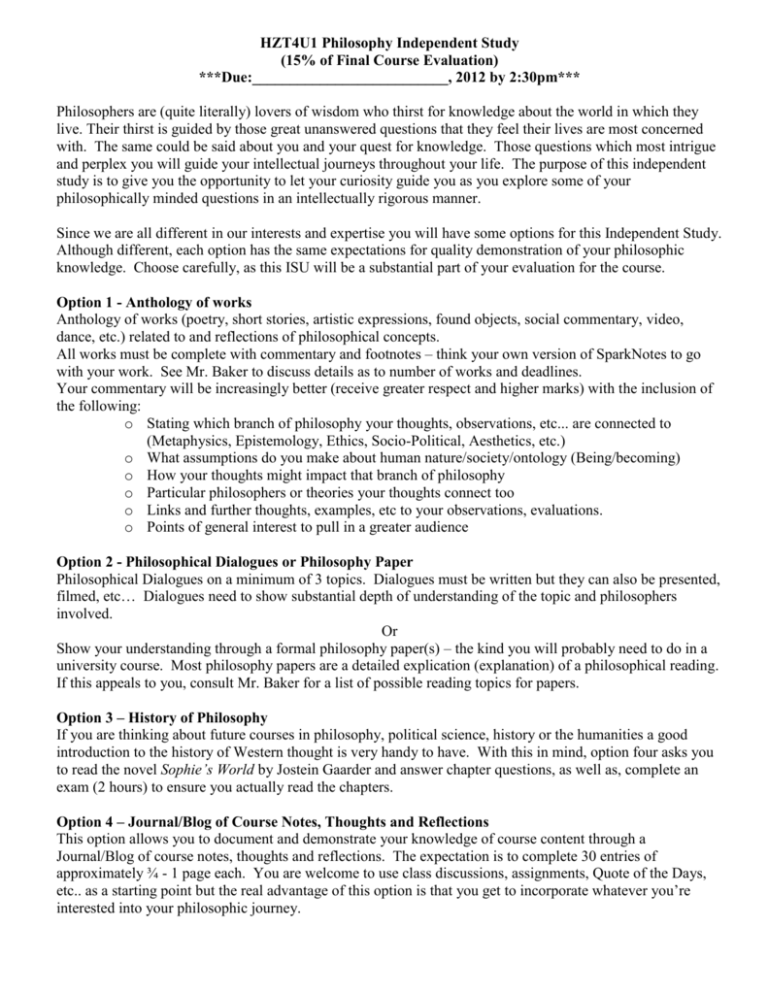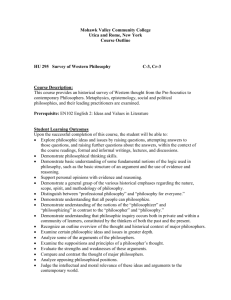HZT4U1 Philosophy Independent Study
advertisement

HZT4U1 Philosophy Independent Study (15% of Final Course Evaluation) ***Due:__________________________, 2012 by 2:30pm*** Philosophers are (quite literally) lovers of wisdom who thirst for knowledge about the world in which they live. Their thirst is guided by those great unanswered questions that they feel their lives are most concerned with. The same could be said about you and your quest for knowledge. Those questions which most intrigue and perplex you will guide your intellectual journeys throughout your life. The purpose of this independent study is to give you the opportunity to let your curiosity guide you as you explore some of your philosophically minded questions in an intellectually rigorous manner. Since we are all different in our interests and expertise you will have some options for this Independent Study. Although different, each option has the same expectations for quality demonstration of your philosophic knowledge. Choose carefully, as this ISU will be a substantial part of your evaluation for the course. Option 1 - Anthology of works Anthology of works (poetry, short stories, artistic expressions, found objects, social commentary, video, dance, etc.) related to and reflections of philosophical concepts. All works must be complete with commentary and footnotes – think your own version of SparkNotes to go with your work. See Mr. Baker to discuss details as to number of works and deadlines. Your commentary will be increasingly better (receive greater respect and higher marks) with the inclusion of the following: o Stating which branch of philosophy your thoughts, observations, etc... are connected to (Metaphysics, Epistemology, Ethics, Socio-Political, Aesthetics, etc.) o What assumptions do you make about human nature/society/ontology (Being/becoming) o How your thoughts might impact that branch of philosophy o Particular philosophers or theories your thoughts connect too o Links and further thoughts, examples, etc to your observations, evaluations. o Points of general interest to pull in a greater audience Option 2 - Philosophical Dialogues or Philosophy Paper Philosophical Dialogues on a minimum of 3 topics. Dialogues must be written but they can also be presented, filmed, etc… Dialogues need to show substantial depth of understanding of the topic and philosophers involved. Or Show your understanding through a formal philosophy paper(s) – the kind you will probably need to do in a university course. Most philosophy papers are a detailed explication (explanation) of a philosophical reading. If this appeals to you, consult Mr. Baker for a list of possible reading topics for papers. Option 3 – History of Philosophy If you are thinking about future courses in philosophy, political science, history or the humanities a good introduction to the history of Western thought is very handy to have. With this in mind, option four asks you to read the novel Sophie’s World by Jostein Gaarder and answer chapter questions, as well as, complete an exam (2 hours) to ensure you actually read the chapters. Option 4 – Journal/Blog of Course Notes, Thoughts and Reflections This option allows you to document and demonstrate your knowledge of course content through a Journal/Blog of course notes, thoughts and reflections. The expectation is to complete 30 entries of approximately ¾ - 1 page each. You are welcome to use class discussions, assignments, Quote of the Days, etc.. as a starting point but the real advantage of this option is that you get to incorporate whatever you’re interested into your philosophic journey. What you need to demonstrate… The following list of overall expectations are what the Ministry of Education requires teachers to base their evaluation of students in HZT4U1. Please review them and understand that the more of them you demonstrate and the higher the quality of each demonstration will increase your mark for your independent study. Identify, summarize and analyse the main questions, concepts, arguments and theories of the main branches of philosophy. Evaluate the strengths and weaknesses of responses to some of the main questions of philosophy defended by some major philosophers and schools of philosophy, and defend their own responses. Demonstrate the relevance of philosophical questions and theories to everyday life. Illustrate how philosophical theories are presupposed in other subjects. Correctly use the terminology of philosophy. Demonstrate an understanding of the unique character of philosophical questions. Effectively use a variety of print and electronic sources and telecommunications tools in research. Effectively communicate the results of their inquiries.






